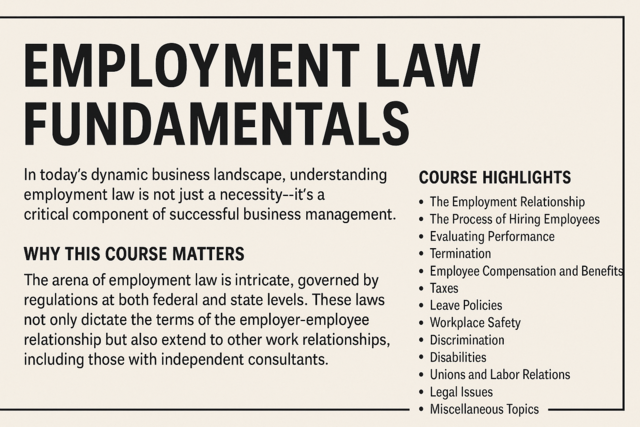Solving Classroom Discipline Problems
Transform Conflict into Collaboration for a Peaceful Classroom

7 Hours average completion time
0.7 CEUs
13 Lessons
14 Exams & Assignments
16 Discussions
13 Videos
14 Reference Files
120 Articles
Mobile Friendly
Last Updated January 2026
Imagine stepping into a classroom where every student is engaged, curious, and ready to learn. Picture yourself leading that classroom with absolute confidence, skillfully turning potential discipline issues into opportunities for growth and learning. This is not a far-off dream, but a reachable reality--and it's all waiting for you in our transformative course, Solving Classroom Discipline Problems.
In today's fast-paced educational landscape, the skills you acquire in this course are not just advantageous but vital. They arm you with the capabilities to create and maintain a harmonious classroom environment where both you and your students thrive. More than just a "course," it's a journey that empowers you to take control of your teaching experience, building a bridge of understanding and cooperation between you and your students.
The essence of this captivating course lies not just in its content, but in its unique approach--a tapestry woven from proven strategies that breathe life into your role as an educator. Here, you'll go beyond theory and immerse yourself in a realm of practical applications, where each lesson is an expedition into creating classrooms that prosper on mutual respect and shared goals. This foundation ensures that disciplinary problems become rare interruptions rather than daily occurrences, allowing you to focus on what truly matters: fostering an exciting learning environment.
What sets Solving Classroom Discipline Problems apart is its focus on both the analytical and the human aspects of teaching. Engaging in behavior analysis will equip you with the tools to identify and transform disruptive actions into constructive classroom dynamics. You'll develop a keen understanding of the psychology behind student behavior, enabling you to tailor your disciplinary approach with empathy and precision. This is your chance to move from reactive to proactive, anticipating challenges and meeting them with strategies grounded in research and experience.
Imagine adopting globally respected methods like assertive discipline, which teaches you to address even the most challenging behaviors head-on while fostering an atmosphere of mutual respect. Imagine a classroom where communication thrives, and every student feels acknowledged and valued. Through cooperative discipline, you'll delve into the motives driving student misbehavior, transforming potential disruptions into teachable moments that promote emotional maturity and self-awareness.
And that's not all--what if you could empower your students to make choices that align with their own success? The course introduces you to strategies that emphasize choice and responsibility, inspired by Dr. William Glasser's Reality Therapy. By understanding and addressing the fundamental needs of your students, you guide them toward positive behavior changes that extend beyond the classroom.
But transforming a classroom starts with transforming yourself. This course helps you cultivate transformative skills, aligning with emotional and social learning principles that enrich both personal and academic growth. By enhancing your interpersonal skills and emotional intelligence, you will nurture an environment where students are free to explore, experiment, and excel.
In an ever-changing world, fostering a democratic learning environment becomes essential. Our deep dive into democratic discipline teaches you to turn your classroom into a society of its own, where students are not only learners but active participants, growing into responsible citizens who value freedom and equality.
Picture concluding your course journey with a personalized discipline blueprint, crafted to reflect your unique teaching style and your classroom's distinctive needs. This is more than just a plan--it's a living document, growing and evolving with you, ensuring that your classroom management skills remain as dynamic and adaptable as your students.
The rewards of this course are vast, touching upon every facet of classroom interaction, bringing a sense of peace, order, and unyielding confidence into your professional life. Are you ready to transform your teaching experience, unlock your students' potential, and truly make a difference? Enroll in Solving Classroom Discipline Problems and step into a future where effective classroom management empowers you to inspire, lead, and change lives. Your classroom awaits your masterful touch.
- Promote emotional and social learning
- Collaborate with parents effectively
- Empower students through choice and responsibility
- Understand student behavior motivations
- Integrate multicultural learning strategies
- Foster a positive classroom environment
- Develop effective classroom management strategies
- Cultivate assertive discipline methods
- Enhance student engagement and cooperation
- Create personalized discipline plans
- Implement conflict resolution techniques









